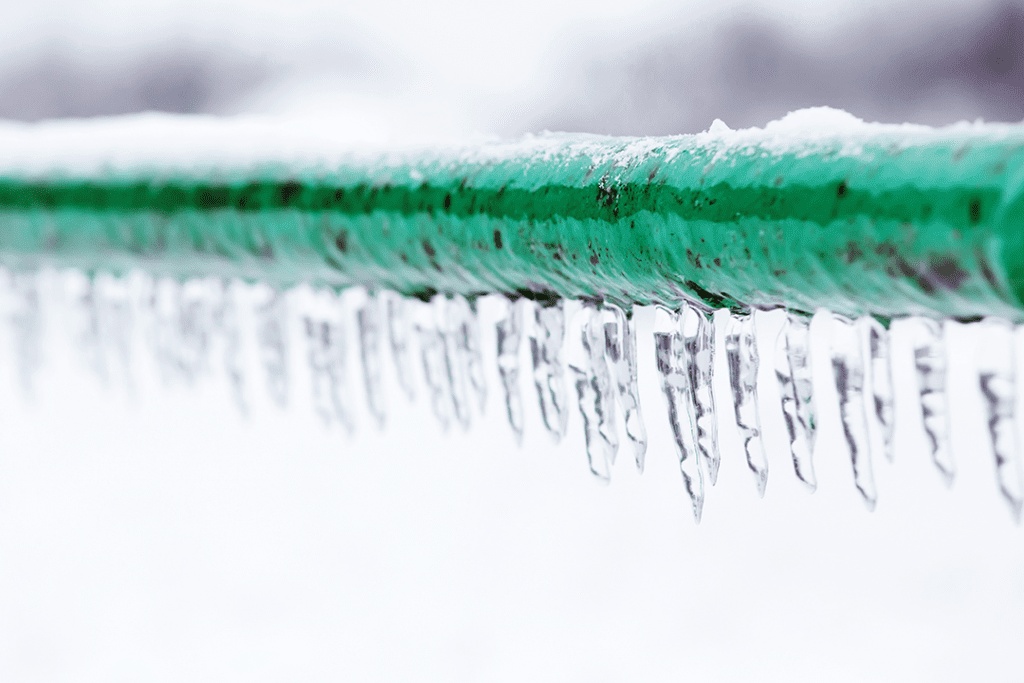
How to prevent frozen pipes

The residents of Indianapolis are used to braving the harsh winter conditions in Central Indiana, so we know how to protect ourselves from winter's frigid temperatures. We bundle up in sweaters, gloves and scarves before we head outside. Indoors, we adjust the thermostat, drink warm beverages, and maybe snuggle up in a blanket.
Unfortunately, too many of our customers here in Central Indiana forget about their plumbing until it's too late. When you neglect your plumbing during the winter, you run the risk of icy morning showers, cracked or frozen pipes, and even flooding and leaks on the coldest days of the year.
Frozen pipes are one of the worst plumbing disasters a homeowner can experience because they can cause significant damage to your home's ceiling, interior and exterior walls, floors and furniture, making your home uninhabitable. A one-eighth inch crack in a pipe has the potential to leak as much as 250 gallons of water per day! That can be catastrophic if you're out of town for business or vacation.
Prevent pipes from freezing this winter by reading the following tips from the licensed plumbers at Chapman. For all of your plumbing repair, maintenance and installation needs, contact Chapman today.
Simple Steps to Avoid Frozen Pipes
Thankfully, there are steps that you can take to prevent pipes from freezing. Just taking a few extra minutes to take these simple steps to avoid frozen pipes will help prevent these potential problems.
Leave Water Running
If the Indiana winter forecast calls for temperatures below zero even if there is no snow or freezing rain predicted, it is time to take steps to prevent pipes from freezing. Leave the faucet in all your sinks (bathroom, kitchen and even mudroom) dripping slightly to reduce water pressure in the pipes and keep the pipes from freezing. It only needs to be a slow trickle, not a stream. This is especially important for any pipes that are located on exterior walls, rather than on interior walls.
Let Warm Air Circulate
Leave cabinet doors under the sinks in your kitchen and bathrooms open so warm air will circulate around the pipes. Just like you bundle up when you go outdoors, bundle up your pipes. You can also use foam padding sleeves to guard your pipes during the cold weather months to help keep exposed plumbing warm.
Remember those pipes in the basement or unused areas of your home, too. Don't let frost accumulate or cracks develop, which can lead to so many other problems.
Don't Forget the Outdoors
When freezing temperatures hit, you want to make sure to disconnect water hoses from faucets, cutting off the water supply. Drain the hose and bring it indoors if you can. You also need to close the shut-off valve on the pipes that lead to your outdoor spigots. When spring finally arrives, roll the hose back out to bring back the water supply.
In addition, you can use insulating faucet covers, rags or trash bags around your outdoor faucets for extra protection.
Caulking and Sealing
According to the Indiana Office of Utility Consumer Counselor, sealing, caulking and weather stripping can improve the energy efficiency of your home and help decrease the risk of a frozen pipe. Make sure to seal basements and crawl spaces as tightly as you can to try and prevent cold air from coming in.
Are You Heading to a Warmer Climate?
When you leave town you probably ask one of your neighbors to get your mail, feed your cat, and watch the house. Add one more thing to their to-do list. If the weather gets cold, you want them to turn on the faucets for you. This will help to prevent freezing pipes in your home.
What to Do if Your Pipes Freeze
Obviously, you should prevent pipes from freezing whenever possible. However, life happens. Even if you're prepared for the worst, there's always a chance something could go wrong. If your pipes do freeze and cause damage to your home, follow these guidelines.
- Turn off the water immediately. Leaking water from thawing pipes could cause an electrical shortage.
- Call Chapman Heating & Air Conditioning for help.
- Do not use heat lamps or electrical appliances to thaw your pipes.
- Contact your insurance agency if severe property damage has occurred.
- Take as many photos of the damage as possible before repairs are made.
Contact Chapman for Plumbing Emergencies
For more tips on how to keep your pipes from freezing, get in touch with the plumbing professionals at Chapman. If you already have a pipe that has frozen, call us today to get an inspection from a professional and learn how to best limit the damage.
Call Chapman Heating and Air Conditioning at 317-207-9378 or schedule an appointment today.
Chapman Heating, Air Conditioning, and Plumbing, carries a full line of plumbing services, including leak detection and freezing pipe repair. Contact us to recommend the best services for your home.








